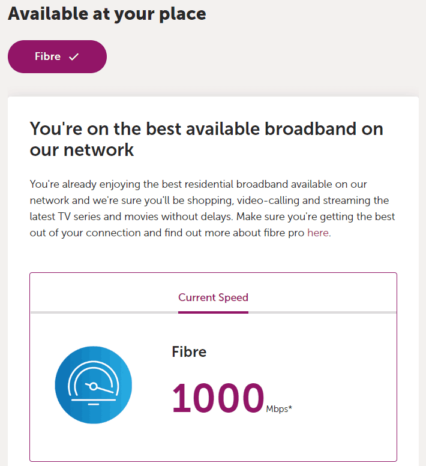Faster Internet
When it comes to getting an Internet connection, you have a number of options. ADSL, VDSL, UFB, Fibre, Wireless, Satellite... There are at least two dozens of Internet Service Providers. How do you choose the best one?
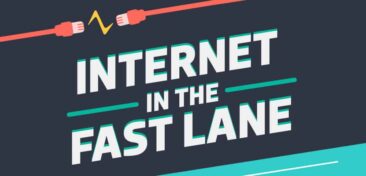
Common Networking Terms You Should Know
Broadband Internet packages are all different. Here are the most important terms you should know
- Megabits per second. This is the most common way of measuring Internet speed. Think of it as the throughput of a road. More lanes doesn't mean that you can drive faster. But if the road is congested, more lanes will help to ease the traffic.
- Download speed. This is how fast your computer or router can receive data from the Internet. Common speeds are from 2 Mbps (slow ADSL connection) to Gigabit (roughly 1000 Mbps, very fast Fibre connection)
- Upload speed. This is how fast your computer can send data to the Internet. Useful for online backups, uploading pictures, and working remotely. Typically, will be slower than download speeds, especially on old copper connections. Typical speeds are from 0.5 Mbps to 400 Mbps
- Ping - the amount of time it takes for data to travel between you and a server on the Internet. Lower is better. This affects the speed of browsing, reliability of the connection in general, and how smooth your experience will feel. Low ping is important for multiplayer games, video and audio chats, and phone calls
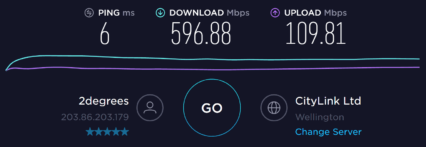
This is a very fast connection - probably overkill for most people
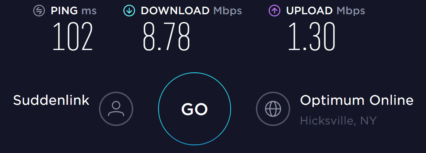
This is a typical copper ADSL connection. These were common a few years ago and now getting replaced by UFB and Wireless
Legacy Internet Connection Types
These have been around for decades. There is no more investment in the infrastructure to keep copper wiring reliable.
- Dial-Up. Was popular in the 90s, now mostly gone. Uses the public switched telephone network (PSTN) and a modem. Very slow and unreliable, it's still used in very remote rural areas. Less than 1% of all connections. Typical speed is 56k - that's 1/20 of a megabit!
- Satellite. Only used in very remote areas and should be avoided at all costs. The signal has to travel to space and back, so it's very slow, unreliable and expensive. It's usually provided by Farmside and Wireless Nation.
- ADSL and ADSL2. A big improvement over Dial-Up. Also relies on the copper telephone lines but uses a different frequency. Reliability and speeds are very dependent on the distance from the exchange cabinets. Still used by about 20% of the population. Typical download speed 5-10 Mbps, upload <1 Mbps
- VDSL. The best and fastest Internet connection over the phone line. Only available in cities and towns. If you can't get Fibre, VDSL is your best bet. Typical download speed 20-30 Mbps, upload <5 Mbps
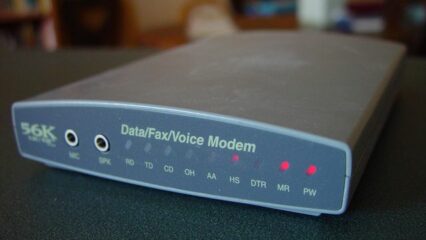
Haven't seen these for years. Good riddance!
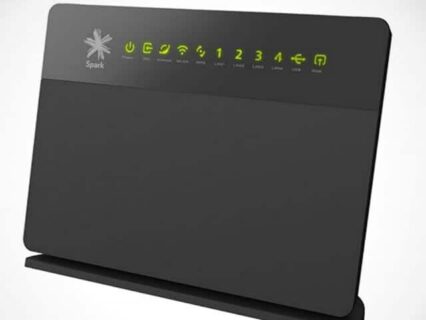
A typical ADSL modem - still commonly used!
Modern Internet Connection Types
If you live in or near major cities or towns, the options below are your best bet
- UltraFast Broadband (UFB) - commonly known as Fibre. Hands down, the most reliable and fastest way to use the Internet. Most common speed is 100 Mbps download and 30 Mbps upload but faster connections are becoming more available, with speeds up to 900/400 Mbps!
- 3G and 4G Wireless Broadband. Uses the same cellphone towers but with faster speeds, higher data allowances and availability in most rural areas, this is the best option. We can supply it for you, including a fully unlimited 3G plan! Tyical speeds vary from 2 to 30 Mbps for downloads, and 1 to 10 Mbps for uploads
- Wireless Internet Service Providers (WISPs). Use point-to-point antennas to transmit data to and from towers that are connected to a Fibre or VDSL link. These are provided by small businesses to rural communities. Speeds and costs vary greatly but you usually get a good deal
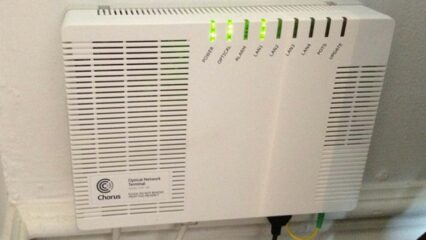
How To Get The Fastest Internet Possible
Ignore the claims of "fastest" and "best". Most New Zealand providers typically offer the same reliability and speeds
- Unless you pay for a more expensive business-grade connection, your provider only has to supply you with basic connectivity. It will work and be good enough for most people but don't expect consistent speeds and reliability.
- All DSL and Fibre providers use the same infrastructure provided by Chorus so the only difference will be pricing, what kind of router you get and what level of customer service to expect
- If you are stuck with ADSL, call your provider and ask if VDSL is available. You may need to upgrade wiring and equipment in your house.
- If VDSL isn't available, your next best option is either 4G Rural Broadband or WISP. Talk to your neighbors and ask what they use!
- If Fibre is available or coming to you soon (you can check on Chorus website), switch to it as soon as possible! Don't settle for the cheapest and limited plan. It helps to shop around.
Internet Providers We Recommend (And Don't!)
With so many Internet Providers around, how do you choose the best one? The lists below is based on our experience with hundreds of customers...
- 2 degrees. We are using them for both business and home connections. While they are far from cheapest, they have decent New Zealand based support, answer phone quickly, and provide good routers
- MyRepublic. This provider is good for gamers. They offer the cheapest Gigabit plan with a Static IP address. Phone support is usually good
- Stuff Fibre. They provide one of the best routers on their 12-month plans and you can pay extra to get an even better one. Offer decent phone and chat support.
- Skinny. Probably one of the cheapest decent providers. Beware of the lowest priced plans, they are not unlimited.
- Voyager. Decent support and they also provide good value VOIP plans, with better voice clarity and cheaper phone calls.
- Vodafone. Biggest provider in New Zealand. Very inconsistent performance, some people swear by it, some have nothing but a headache. Unless you are interested in Vodafone TV (good alternative to Sky), stay away
- Spark. One of the most popular providers, with a variety of options, from ADSL, to RBI and UFB. Plans have good value, but their tech support usually sucks. When you call them, they usually call back in several hours
- TrustPower. When people call us and ask to help with their Internet issues, the first question we ask is "Are you with Trustpower". Enough said? They bundle power and Internet in one deal but it's usually more expensive than competition
- Orcon and Slingshot. Usually cheap, but suffer from inconsistent performance. Cheap routers and average tech support
Just Fix It!
Or what if you already tried everything...
- Most consumer grade equipment works much better when it's rebooted regularly. If your modem or router keep actin weird, unplug them, leave off for a few minutes and then turn them on again. Shouldn't have to do it but it helps!
- Wireless is a common bottleneck. Your Internet might be ok but if you have an old router or several wireless devices, they all share a tiny portion of your bandwidth. We can replace your WiFi with a much better router and cover your whole house, shop, or office.
- Try to schedule your downloads, online backups, and installation of updates in off-peak times, preferably late at night.
- Contact your ISP and ask them to reset your port, this can fix certain signal issues. If this doesn't work, you can also get them to monitor your connectivity for a few days and report back. If they find a fault on their end, they'll get it fixed for free. If it's on your end and you didn't get wiring insurance, you'll need to pay for the repair.
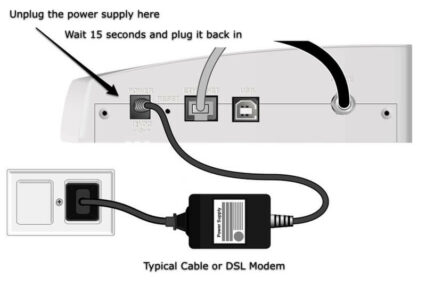
Tips for Gamers
Multiplayer online games are particularly sensitive to the quality of your Internet connection!
- It's best to hard wire gaming desktops and consoles with Ethernet cables for faster speeds. Make sure you are using CAT5e or CAT6 cables and your speed is reported as 1 Gbps
- Check if all updates are installed - you don't want those during gaming sessions. Turn off all unnecessary programs, especially those that can download a lot of data, like torrent clients, browsers, Dropbox, Google Drive, OneDrive, etc
- If you want to host websites, multiplayer games or other services from your home connection, make sure your ISP allows it in their terms of service. You may have to pay an extra fee for a public or static IP address, as many providers use CG-NAT which doesn't allow for the port forwarding needed for public sources to access your network.


